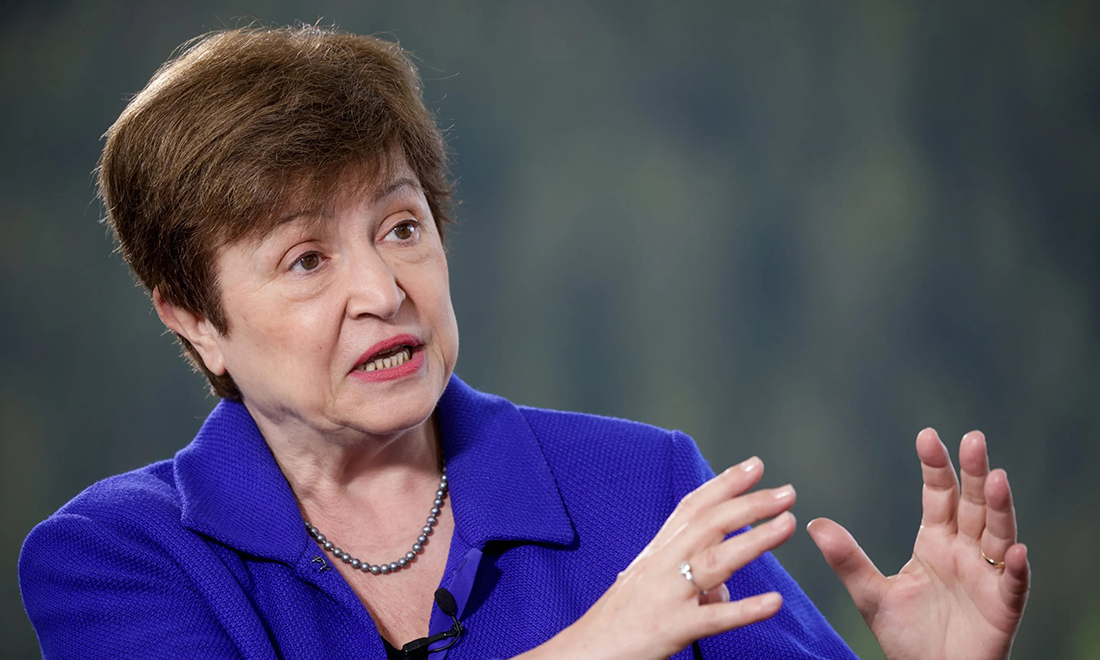
國際貨幣基金組織(International Monetary Fund)的總裁認(rèn)為,,事實(shí)證明,,通脹比預(yù)期更加“頑固”,世界各國的央行行長需要“頑抗到底”,。
克里斯塔利娜·格奧爾基耶娃在9月14日與法國央行行長弗朗索瓦·維勒魯瓦·德·加豪的一次活動中表示,,通脹“比我們想象的更為廣泛”。
格奧爾基耶娃補(bǔ)充稱,,經(jīng)濟(jì)學(xué)家在2021年10月的看法更樂觀,,原因是經(jīng)濟(jì)高速增長和新冠疫苗的接種。但是,,她說:“在奧密克戎來襲,、俄烏沖突爆發(fā)以及今年夏天氣候影響農(nóng)業(yè)生產(chǎn)時,事實(shí)證明我們的看法是錯誤的,?!?/p>
國際貨幣基金組織的總裁承認(rèn)判斷失誤,這與其他經(jīng)濟(jì)學(xué)家和央行行長如今對通脹的看法不謀而合,。他們過去錯誤地認(rèn)為通脹是一種暫時現(xiàn)象,。美聯(lián)儲(U.S. Federal Reserve)的主席杰羅姆·鮑威爾和美國財政部的部長珍妮特·耶倫都預(yù)測,在2021年的大部分時間里,,通貨膨脹將是“暫時的”,,但他們在去年年底放棄了這一說法。耶倫今年早些時候在接受美國有線電視新聞網(wǎng)(CNN)采訪時表示,,她“對通脹走勢的判斷出現(xiàn)失誤”,。
格奧爾基耶娃本人在今年5月告訴路透社(Reuters),這波奧密克戎疫情讓她相信通脹不會是暫時現(xiàn)象,。
“頑固”的通貨膨脹
經(jīng)濟(jì)學(xué)家預(yù)計(jì),,在美國、英國和其他國家大幅加息以及天然氣價格下降之后,,通貨膨脹可能會在夏季開始降溫,。然而,通脹持續(xù)高于預(yù)期,,這表明物價上漲已經(jīng)擴(kuò)大到整個經(jīng)濟(jì)領(lǐng)域,。
9月13日,美國勞工部(U.S. Department of Labor)報告稱,,物價環(huán)比上漲0.1%,。食品、房租和其他商品價格上漲抵消了汽油價格下跌,??鄢秃褪称穬r格的核心CPI環(huán)比上漲0.6%。
歐盟(European Union)報告稱,,8月通脹同比上漲9.1%,,主要受能源價格同比上漲38.3%的影響,。歐洲國家今年冬天可能需要對能源供應(yīng)實(shí)行配給。
9月14日,,英國公布8月通脹同比上漲9.9%,,較上月公布的10.1%的同比增幅略有下降。英國國家統(tǒng)計(jì)局(Office for National Statistics)表示,,通脹略有降溫是由于天然氣價格下跌,,而英國食品價格則繼續(xù)上漲。
央行行長要頑抗到底
在高于預(yù)期的通脹報告發(fā)布后,,經(jīng)濟(jì)學(xué)家認(rèn)為美聯(lián)儲于9月會議宣布大幅加息的可能性增大,,一些分析師目前預(yù)測美聯(lián)儲會加息整整一個百分點(diǎn)。9月13日,,投資者對美國通脹消息感到悲觀,引發(fā)了自2020年6月以來前所未有的市場拋售,。9月14日,,美國股市小幅回升,標(biāo)準(zhǔn)普爾500指數(shù)(S&P 500)微漲0.3%,。
歐洲央行(European Central Bank)于9月8日將利率上調(diào)75個基點(diǎn),,并承諾將進(jìn)一步加息以對抗通脹。本月早些時候,,加拿大和澳大利亞的央行也分別加息75個基點(diǎn)和50個基點(diǎn),。
經(jīng)濟(jì)學(xué)家還預(yù)測,繼8月加息50個基點(diǎn)后,,英國本周將加息50個基點(diǎn),。
國際貨幣基金組織的總裁格奧爾基耶娃在9月14日表示,“如果各國央行做好本職工作”,,通脹可能在明年前回落,。然而,她也擔(dān)心,,“如果財政政策針對性不強(qiáng)”,,政府實(shí)施的刺激措施可能會對央行遏制物價上漲的努力產(chǎn)生不利影響。(財富中文網(wǎng))
譯者:中慧言-王芳
國際貨幣基金組織(International Monetary Fund)的總裁認(rèn)為,,事實(shí)證明,,通脹比預(yù)期更加“頑固”,世界各國的央行行長需要“頑抗到底”,。
克里斯塔利娜·格奧爾基耶娃在9月14日與法國央行行長弗朗索瓦·維勒魯瓦·德·加豪的一次活動中表示,,通脹“比我們想象的更為廣泛”。
格奧爾基耶娃補(bǔ)充稱,,經(jīng)濟(jì)學(xué)家在2021年10月的看法更樂觀,,原因是經(jīng)濟(jì)高速增長和新冠疫苗的接種,。但是,她說:“在奧密克戎來襲,、俄烏沖突爆發(fā)以及今年夏天氣候影響農(nóng)業(yè)生產(chǎn)時,,事實(shí)證明我們的看法是錯誤的?!?/p>
國際貨幣基金組織的總裁承認(rèn)判斷失誤,,這與其他經(jīng)濟(jì)學(xué)家和央行行長如今對通脹的看法不謀而合。他們過去錯誤地認(rèn)為通脹是一種暫時現(xiàn)象,。美聯(lián)儲(U.S. Federal Reserve)的主席杰羅姆·鮑威爾和美國財政部的部長珍妮特·耶倫都預(yù)測,,在2021年的大部分時間里,通貨膨脹將是“暫時的”,,但他們在去年年底放棄了這一說法,。耶倫今年早些時候在接受美國有線電視新聞網(wǎng)(CNN)采訪時表示,她“對通脹走勢的判斷出現(xiàn)失誤”,。
格奧爾基耶娃本人在今年5月告訴路透社(Reuters),,這波奧密克戎疫情讓她相信通脹不會是暫時現(xiàn)象。
“頑固”的通貨膨脹
經(jīng)濟(jì)學(xué)家預(yù)計(jì),,在美國,、英國和其他國家大幅加息以及天然氣價格下降之后,通貨膨脹可能會在夏季開始降溫,。然而,,通脹持續(xù)高于預(yù)期,這表明物價上漲已經(jīng)擴(kuò)大到整個經(jīng)濟(jì)領(lǐng)域,。
9月13日,,美國勞工部(U.S. Department of Labor)報告稱,物價環(huán)比上漲0.1%,。食品,、房租和其他商品價格上漲抵消了汽油價格下跌??鄢秃褪称穬r格的核心CPI環(huán)比上漲0.6%,。
歐盟(European Union)報告稱,8月通脹同比上漲9.1%,,主要受能源價格同比上漲38.3%的影響,。歐洲國家今年冬天可能需要對能源供應(yīng)實(shí)行配給。
9月14日,,英國公布8月通脹同比上漲9.9%,,較上月公布的10.1%的同比增幅略有下降。英國國家統(tǒng)計(jì)局(Office for National Statistics)表示,通脹略有降溫是由于天然氣價格下跌,,而英國食品價格則繼續(xù)上漲,。
央行行長要頑抗到底
在高于預(yù)期的通脹報告發(fā)布后,經(jīng)濟(jì)學(xué)家認(rèn)為美聯(lián)儲于9月會議宣布大幅加息的可能性增大,,一些分析師目前預(yù)測美聯(lián)儲會加息整整一個百分點(diǎn),。9月13日,投資者對美國通脹消息感到悲觀,,引發(fā)了自2020年6月以來前所未有的市場拋售,。9月14日,美國股市小幅回升,,標(biāo)準(zhǔn)普爾500指數(shù)(S&P 500)微漲0.3%,。
歐洲央行(European Central Bank)于9月8日將利率上調(diào)75個基點(diǎn),并承諾將進(jìn)一步加息以對抗通脹,。本月早些時候,,加拿大和澳大利亞的央行也分別加息75個基點(diǎn)和50個基點(diǎn)。
經(jīng)濟(jì)學(xué)家還預(yù)測,,繼8月加息50個基點(diǎn)后,,英國本周將加息50個基點(diǎn)。
國際貨幣基金組織的總裁格奧爾基耶娃在9月14日表示,,“如果各國央行做好本職工作”,通脹可能在明年前回落,。然而,,她也擔(dān)心,“如果財政政策針對性不強(qiáng)”,,政府實(shí)施的刺激措施可能會對央行遏制物價上漲的努力產(chǎn)生不利影響,。(財富中文網(wǎng))
譯者:中慧言-王芳
The director of the International Monetary Fund thinks that inflation has proved more “stubborn” than expected, and that the world’s central bankers need to be just “as stubborn in fighting it.”
Inflation “is more broad-based than we thought it would be,” Kristalina Georgieva said during a September 14 event with Fran?ois Villeroy de Galhau, France’s top central banker.
Georgieva added that economists were more upbeat last October, pointing to high economic growth and COVID vaccinations. But, she said, “we were proven wrong: wrong when Omicron hit, wrong when Russia invaded Ukraine, wrong when during this summer, climate shocks [affected] agricultural productivity,” she explained.
The IMF chief’s mea culpa matches similar admissions from other economists and central bankers that they were wrong about inflation being a passing phenomenon. Both U.S. Federal Reserve Chair Jerome Powell and Secretary of the Treasury Janet Yellen predicted inflation would be “transitory” for much of 2021, before retiring the phrase late last year. Yellen told CNN earlier this year that she “was wrong about the path inflation would take.”
Georgieva herself told Reuters in May that the Omicron wave convinced her that inflation would not be a temporary phenomenon.
“Stubborn” inflation
Economists predicted that inflation might start to cool in the summer, following aggressive rate hikes in the U.S., the U.K., and elsewhere and a fall in gas prices. However, continued higher-than-expected inflation shows that prices are rising across a broad swath of the economy.
On September 13, the U.S. Department of Labor reported that prices increased by 0.1% month on month. An increase in the cost of food, rent, and other goods offset a fall in gas prices. Core CPI, which excludes gas and food prices, increased by 0.6% from the previous month.
The European Union reported 9.1% inflation year on year for August, primarily driven by a whopping 38.3% year on year increase in the price of energy. European countries are facing the prospect of energy rationing heading into the winter.
On September 14, the U.K. reported 9.9% inflation year on year for August, a slight decrease from the 10.1% year-on-year increase reported the previous month. The Office for National Statistics said the slight cooling of inflation was due to a fall in gas prices, even as U.K. food prices continued to rise.
“Stubborn” central bankers
After the higher-than-expected inflation report, economists see a greater chance that the U.S. Federal Reserve will enact a steep interest rate hike at its September meeting, with some analysts now predicting a full percentage point increase. Investors took the U.S. inflation news badly on September 13, sparking a market selloff not seen since June 2020. Stocks recovered slightly on September 14, with the S&P 500 inching up 0.3%.
The European Central Bank raised its interest rates by 75 basis points on Sept. 8, and pledged to raise them even further to battle inflation. Central banks in Canada and Australia also raised interest rates, by 75 and 50 basis points respectively, earlier this month.
Economists also predict that the U.K. will raise interest rates by 50 basis points this week, following a 50 basis point hike in August.
IMF director Georgieva said on September 14 that “if central banks do their job well,” inflation might recede by next year. Yet she also shared concerns that “if fiscal policy is not targeted sufficiently,” government stimulus might work against central banks’ drive to combat rising prices.






